现在完成时语法
现在完成时语法讲

hasn’t finished yet
hasn’t cooked
4.She joined the music club last week.(改为现在完成时) She ___ _____ _____the music club _____two weeks. 适当形式填空 5.He ____________(leave ) the country and gone to India. 6.I have ______(be )here for two months. 7.I’m waiting for my son . He _____ ______( not come ) back from school.
Unit 8 语法课件
单击此处添加副标题
人教版八年级英语下
语法加油站
现在完成时
现在完成时
1.含义
2.基本结构
表示过去发生或已经完成的动作对现在造成的影响或结果。
含义
already yet never ever just before 等等
主语+have/has+过去分词+其他
例:I have had my lunch.我已经吃了午饭了。
现在完成时
3.already:通常放于肯定句中意为“已经”有时放于疑问句中表示怀疑惊讶等的语气。 如: I have already finished reading the book . 我已经读完这本书了。 Have you finished reading he book already? 你已经读完这本书了么? yet 一般用于疑否句中,在句中意为“已经”;在否定句中意为“还”通常放于句末。 如:Have you found the book yet ? 你已经找到那本书了么? Not yet .还没找到。 She hasn’t finished her homework yet. 她还没完成作业。
2024年中考英语语法复习+—现在完成时课件

Have you seen the doctor? 你看过医生了吗?
在现在完成时中,当主语是I/you/we/they时,助动词用 have;当主语是第三人称单数时,助动词用has。
三、现在完成时的使用
1.表示过去发生并结束的动作对现在所产生的影响
He has left the city. 他已离开了这个城市。(结果:他不在这个城市。)
一、基本构成:have/has+done
I have finished my homework. 我已完成了作业。 (这里的finished就是动词finish的 过去分词。)
二、现在完成时不同人称的用法 I have washed my car.我洗过车子了。
We have done the whole work.我们干完了所有活儿。
A.practised
B.were practising C.have been practising
C
3 . —Where is mother?
—She is in the kitchen. She ________ the
housework all morning.
A.is doing
B.was doing
B.was studying
C.studied
D.have been studying
D
15 . “I _____ as everyone expects ”, Yao Ming
said .
A.haven’t played
B.haven’t been playing
C.didn’t play
D.am not playing
(完整)现在完成时语法

(完整)现在完成时语法现在完成时的基本句型:肯定式:主语 + 助动词have/has + 动词的过去分词.疑问式:助动词Have/Has + 主语 + 动词的过去分词?否定式:主语 + 助动词have/has + not + 动词的过去分词。
例句:1. I have cleaned my room。
我已打扫了房间。
2. He hasn’t finished his homework。
他还没完成作业。
3。
Have you read this novel ? 你看过这本小说吗?Yes , I have. 是的,看过了。
No, I haven’t. 不,没看过。
4. We have studied English for two years。
我们已经学了两年英语了.5. They haven’t seen each other since 1998.自从1998年他们就没再见过面.现在完成时的主要用法1.表示过去发生的某一动作对现在造成的影响或结果。
-— It's so dark。
-—Someone has turned off the light.(有人刚把灯关了,对现在造成的结果是:现在很黑)-— Are you free?-—I have finished my homework. I am free(我已经完成了家庭作业,对现在造成的结果是很有空)2.表示过去已经开始, 持续到现在的动作或状态,可以和表示从过去某一时刻延续到现在的一段时间的状语连用。
表示持续动作或状态的词应是延续性动词.常与since + 过去的时间点,since+谓语是一般过去时的从句;for + 一段时间,so far 等时间状语连用。
如:I have learnt English for more than ten years.我已经学了10多年的英语。
(从10年前开始,持续到现在还在学)She has swum since half an hour ago。
现在完成时语法讲解
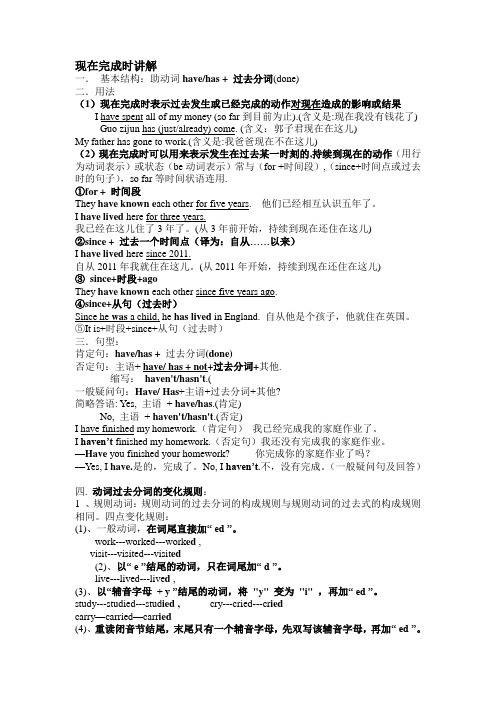
现在完成时讲解一.基本结构:助动词have/has + 过去分词(done)二.用法(1)现在完成时表示过去发生或已经完成的动作对现在造成的影响或结果I have spent all of my money (so far到目前为止).(含义是:现在我没有钱花了)Guo zijun has (just/already) come. (含义:郭子君现在在这儿)My father has gone to work.(含义是:我爸爸现在不在这儿)(2)现在完成时可以用来表示发生在过去某一时刻的,持续到现在的动作(用行为动词表示)或状态(be动词表示)常与(for +时间段),(since+时间点或过去时的句子),so far等时间状语连用.①for + 时间段They have known e ach other for five years. 他们已经相互认识五年了。
I have lived here for three years.我已经在这儿住了3年了。
(从3年前开始,持续到现在还住在这儿)②since + 过去一个时间点(译为:自从……以来)I have lived here since 2011.自从2011年我就住在这儿。
(从2011年开始,持续到现在还住在这儿)③since+时段+agoThey have known each other since five years ago.④since+从句(过去时)Since he was a child, he has lived in England. 自从他是个孩子,他就住在英国。
⑤It is+时段+since+从句(过去时)三.句型:肯定句:have/has + 过去分词(done)否定句:主语+ have/ has + not+过去分词+其他.缩写:haven't/hasn't.(一般疑问句:Have/ Has+主语+过去分词+其他?简略答语: Yes, 主语+ have/has.(肯定)No, 主语+ haven't/hasn't.(否定)I have finished my homework.(肯定句)我已经完成我的家庭作业了。
英语语法现在完成时的结构、用法、考法

英语语法现在完成时的结构、用法、考法一、现在完成时的基本结构肯定句:主语+have/has+动词的过去分词+其他否定句:主语+have/has+not+动词的过去分词+其他一般疑问句:Have/Has+主语+动词的过去分词+其他特殊疑问句:特殊疑问词+一般疑问句(have/has+主语+过去分词+其他)二、现在完成时的用法1. 现在完成时用来表示过去已经完成的动作对现在造成影响或后果。
也就是说,动作或状态发生在过去但它的影响现在还存在,强调的是现在。
I have already posted the photo.我已经邮寄出了照片。
与此种用法连用的时间状语时一些模糊的过去时间状语,如already(肯定句句中), yet(否定句/疑问句句尾), just, before, recently,still, lately,never等。
2. 现在完成时也可用来表示动作或状态发生在过去某一时刻,持续到现在并且有可能会继续持续下去。
He has lived here since 1978.自从1978年以来,他一直住在这儿。
(动作起始于1978年,一直住到现在,可能还要继续住下去。
)此种用法常与for(+时间段),since(+时间点或过去时的句子)连用。
谓语动词必须是延续性动词。
有些瞬间动词可变为延续动词:go out----be outfinish----be overopen----be opendie----be deadbuy---havefall ill---be illcome back----be backcatch a cold----have a cold三、现在完成时常见考法对于现在完成时的考查,多以单选、句型转换或词语运用的形式考查学生在具体语境中灵活运用时态的能力。
在考试中,会让大家判断是否该用现在完成时,或者是考查“瞬间动词”不能与表示一段时间的状语连用”这一知识点。
【典型例题】His father_____the party since 1978A.joindB.has joinedC.was inD.has been in答案:D解析:本题考查学生对现在完成时的熟练掌握。
现在完成时的构成和用法

现在完成时的构成和用法现在完成时是英语语法中的一种时态,用来表示过去发生的动作与现在的关联。
它的构成是由助动词"have"和动词的过去分词构成的。
一、现在完成时的构成:现在完成时的肯定句的构成是:主语 + have/has + 过去分词。
1. 对于大多数动词,过去分词是加上-ed,如:worked, studied, watched等。
例如:- I have worked in this company for 5 years.(我在这家公司工作了5年了。
)- He has studied English since he was a child.(他从小就开始学英语了。
)2. 对于一些不规则动词,过去分词需要根据其语法规则进行变化,如:- go → gone- eat → eaten- write → written例如:- They have gone to the cinema.(他们去看电影了。
)- She has eaten lunch already.(她已经吃过午饭了。
)二、现在完成时的用法:1. 表示已经发生但对现在有影响的动作或状态。
例如:- I have finished my homework, so now I can relax.(我已经完成了作业,所以现在我可以放松了。
)- They have bought a new car, so they don't need to use public transportation anymore.(他们买了一辆新车,所以不再需要使用公共交通工具了。
)2. 表示过去某个时间开始的动作一直延续到现在。
例如:- We have known each other since we were kids.(我们从小就认识。
)- She has lived in this city for 10 years.(她在这个城市住了10年了。
现在完成时的语法
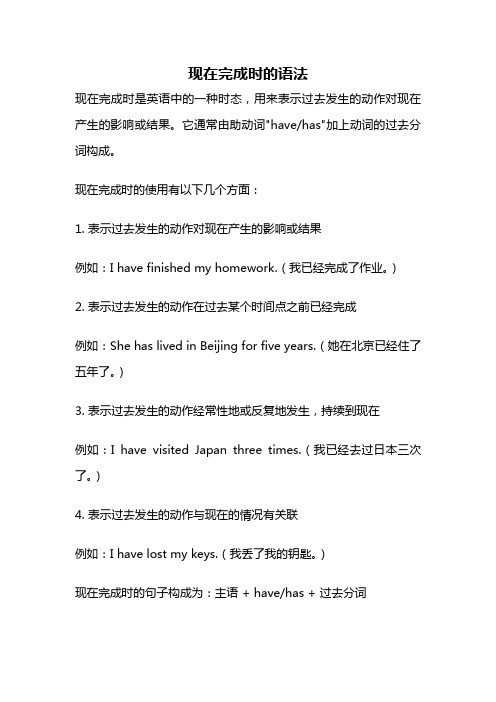
现在完成时的语法现在完成时是英语中的一种时态,用来表示过去发生的动作对现在产生的影响或结果。
它通常由助动词"have/has"加上动词的过去分词构成。
现在完成时的使用有以下几个方面:1. 表示过去发生的动作对现在产生的影响或结果例如:I have finished my homework.(我已经完成了作业。
)2. 表示过去发生的动作在过去某个时间点之前已经完成例如:She has lived in Beijing for five years.(她在北京已经住了五年了。
)3. 表示过去发生的动作经常性地或反复地发生,持续到现在例如:I have visited Japan three times.(我已经去过日本三次了。
)4. 表示过去发生的动作与现在的情况有关联例如:I have lost my keys.(我丢了我的钥匙。
)现在完成时的句子构成为:主语 + have/has + 过去分词使用现在完成时需要注意以下几点:1. 没有明确的过去时间状语词时,使用现在完成时表达过去发生的动作对现在的影响或结果。
例如:I have eaten lunch.(我吃过午饭了。
)2. 使用了明确的过去时间状语词时,要使用一般过去时。
例如:I ate lunch yesterday.(我昨天吃了午饭。
)3. 动词的过去分词形式有规律变化和不规律变化两种。
规律变化的过去分词形式是在动词原形后加-ed或-d,例如:play - played,finish - finished。
不规律变化的过去分词形式则需要根据具体动词的变化规则来记忆,例如:go - gone,eat - eaten。
4. 现在完成时不能与表示过去的时间状语词同时使用。
例如:I have finished my homework yesterday.(错误)正确的表达应该是:I finished my homework yesterday.(我昨天完成了作业。
现在完成时语法解释大全
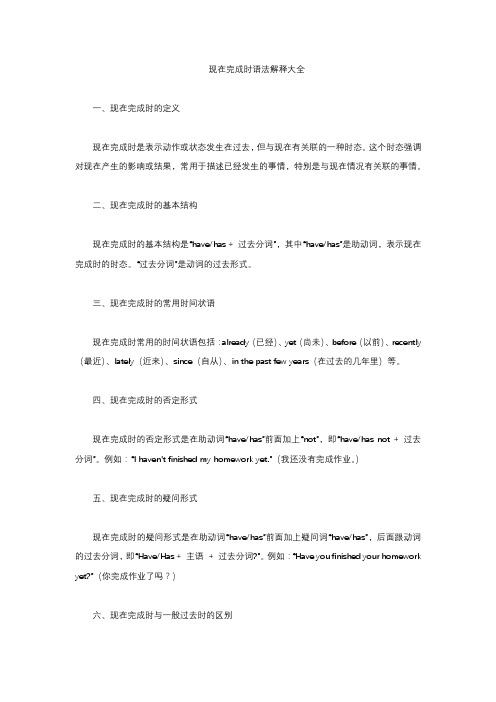
现在完成时语法解释大全一、现在完成时的定义现在完成时是表示动作或状态发生在过去,但与现在有关联的一种时态。
这个时态强调对现在产生的影响或结果,常用于描述已经发生的事情,特别是与现在情况有关联的事情。
二、现在完成时的基本结构现在完成时的基本结构是“have/has + 过去分词”,其中“have/has”是助动词,表示现在完成时的时态。
“过去分词”是动词的过去形式。
三、现在完成时的常用时间状语现在完成时常用的时间状语包括:already(已经)、yet(尚未)、before(以前)、recently (最近)、lately(近来)、since(自从)、in the past few years(在过去的几年里)等。
四、现在完成时的否定形式现在完成时的否定形式是在助动词“have/has”前面加上“not”,即“have/has not + 过去分词”。
例如:“I haven't finished my homework yet.”(我还没有完成作业。
)五、现在完成时的疑问形式现在完成时的疑问形式是在助动词“ha ve/has”前面加上疑问词“have/has”,后面跟动词的过去分词,即“Have/Has + 主语+ 过去分词?”。
例如:“Have you finished your homework yet?”(你完成作业了吗?)六、现在完成时与一般过去时的区别现在完成时与一般过去时都表示过去发生的动作或状态,但它们的重点不同。
现在完成时强调对现在的影响或结果,而一般过去时只是简单地描述过去发生的事情,不涉及现在的状态。
例如:“I finished my homework an hour ago.”(我一小时前完成了作业。
)(用一般过去时)和“I have finished my homework now.”(我已经完成了作业。
)用现在完成时则强调现在不需要做作业了,对现在的情况产生了影响。
初中英语 现在完成时

初中英语语法现在完成时一、构成肯定句:have/has+主语+过去分词+其它(当主语是第三人称单数时,用has,其它的用have。
过去分词:规则过去分词与动词过去式相同,不规则动词要特殊记忆)否定句:have/has+主语+not+过去分词+其它疑问句:Have/Has+主语+过去分词+其它简答:Yes, 主语+have/has.No, 主语+haven’t/hasn’t二、现在完成时的用法(一)现在完成时的用法一1:表示过去发生或已经完成的某一动作对现在造成的影响或结果。
2.谈论到现在为止曾经经历或者没有经历的事情。
3.表达刚刚做完某事,已经做完某事,可与just ,already,yet连用。
此时,常与时间副词already(已经),yet(还、已经),just(刚刚、仅仅) ,ever(曾经),never(从不),before(以前)等连用。
这几个副词的用法如下:1.already意为“已经”,通常用于肯定句中,可放在助动词之后,过去分词之前,也可以放在句末。
实例:1)I've already read this book. 我已经读过这本书了。
(“读”这一动作发生在过去,对现在造成的影响是“知道书中的内容”。
)2)I've washed my clothes already.我已经洗了衣服。
(洗衣服的动作已完成,其结果是“衣服冼干净了”。
)注意:在表示吃惊或明知故问等感情色彩时,already也可用于(口语)疑问句中。
实例:3)Have you met him already ?你(真的)已经见过他了?2.yet用在疑问句中意为“已经”,用在否定句中意为“还”,常放在句末。
实例:1)—Has he found his watch yet ?他已经找到他的手表了吗?—No,not yet.不,还没有。
2)The woman hasn't found her dog yet .那位妇女还没有找到她的狗。
现在完成时语法总结讲解
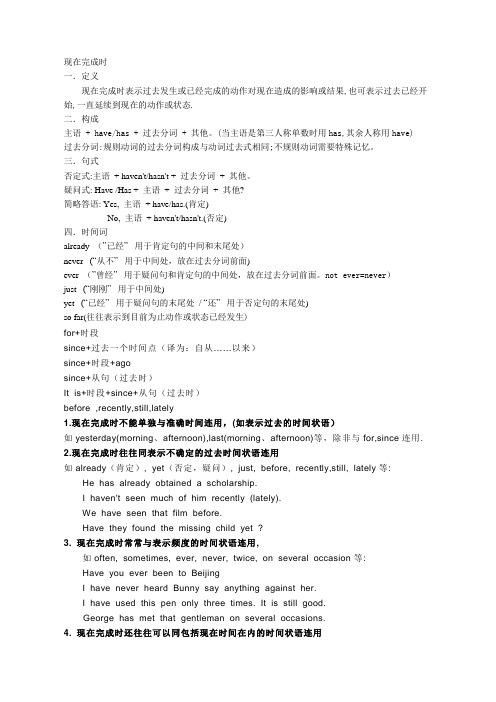
现在完成时一.定义现在完成时表示过去发生或已经完成的动作对现在造成的影响或结果,也可表示过去已经开始,一直延续到现在的动作或状态.二.构成主语 + have/has + 过去分词 + 其他。
(当主语是第三人称单数时用has,其余人称用have) 过去分词:规则动词的过去分词构成与动词过去式相同;不规则动词需要特殊记忆。
三.句式否定式:主语+ haven't/hasn't + 过去分词+ 其他。
疑问式: Have /Has + 主语+ 过去分词+ 其他?简略答语: Yes, 主语+ have/has.(肯定)No, 主语+ haven't/hasn't.(否定)四.时间词already (”已经”用于肯定句的中间和末尾处)never (“从不”用于中间处,放在过去分词前面)ever (”曾经”用于疑问句和肯定句的中间处,放在过去分词前面。
not ever=never)just (“刚刚”用于中间处)yet (“已经”用于疑问句的末尾处/ “还”用于否定句的末尾处)so far(往往表示到目前为止动作或状态已经发生)for+时段since+过去一个时间点(译为:自从……以来)since+时段+agosince+从句(过去时)It is+时段+since+从句(过去时)before ,recently,still,lately1.现在完成时不能单独与准确时间连用,(如表示过去的时间状语)如yesterday(morning、afternoon),last(morning、afternoon)等,除非与for,since连用.2.现在完成时往往同表示不确定的过去时间状语连用如already(肯定), yet(否定,疑问), just, before, recently,still, lately等: He has already obtained a scholarship.I haven't seen much of him recently (lately).We have seen that film before.Have they found the missing child yet ?3. 现在完成时常常与表示频度的时间状语连用,如often, sometimes, ever, never, twice, on several occasion等:Have you ever been to BeijingI have never heard Bunny say anything against her.I have used this pen only three times. It is still good.George has met that gentleman on several occasions.4. 现在完成时还往往可以同包括现在时间在内的时间状语连用如now, up to these few days/weeks/months/years, this morning/week/month/ year, just, today, up to present, so far等:Peter has written six papers so far.Man has now learned to release energy from the nucleus of the atom.There has been too much rain in San Francisco this year.The friendly relations and cooperation between our two countries have been enhanced in the past few years.Up to the present everything has been successful.5. 现在完成时还可以用来表示过去的一个时间到现在这段时间内重复发生的动作.We have had four texts this semester.have been to…表示“去过某地”(表示过去的经历,现在已经回来)have gone to…表示“去了某地”(表示出去了,还没有回来)。
(完整)高中英语语法之现在完成时

现在完成时讲解一、基本结构:主语+have/has+过去分词(done)①肯定句:主语+have/has+过去分词+其他②否定句:主语+have/has+not+过去分词+其他③一般疑问句:Have/Has+主语+过去分词+其他④特殊疑问句:特殊疑问词+一般疑问句(have/has+主语+过去分词+其他)二、用法1)现在完成时的"完成用法"现在完成时用来表示现在之前已发生过或完成的动作或状态,但其结果却和现在有联系,也就是说,动作或状态发生在过去但它的影响现在还存在.He has turned off the light.他已把灯关了。
(动作结束于过去,但说明的是现在的情况--灯现在不亮了。
)I have spent all of my money.(含义是:现在我没有钱花了.)Jane has laid the table.(含义是:现在桌子已经摆好了.)2)现在完成时的"未完成用法"指的是动作开始于过去某一时刻,一直延续到现在,或可能还要继续下去。
这里的动词要用持续性动词。
常与for (+时间段),since(+时间点)连用.Mary has been ill for three days.Mary has been ill since three days ago.注意:1.现在完成时不能单独与准确时间连用,(如表示过去的时间状语)如yesterday(morning、afternoon),last(morning、afternoon)等,除非与for, since连用.2.现在完成时往往同表示不确定的过去时间状语连用,如already(肯定), yet(否定,疑问), just, before, recently, still, latel y等:He has already obtained a scholarship.I haven't seen much of him recently (lately).We have seen that film before.Have they found the missing child yet ?3. 现在完成时常常与表示频度的时间状语连用,如ever, never, twice, several times等:Have you ever been to BeijingI have never heard Bunny say anything against her.I have used this pen only three times. It is still good.George has met that gentleman several times.4. 现在完成时还往往可以同包括现在时间在内的时间状语连用,如up to these few days/weeks/months/years, just, up to present(now), so far等:Peter has written six papers so far.Up to the present everything has been successful.5. 现在完成时还可以用来表示过去的一个时间到现在这段时间内重复发生的动作.We have had four texts this semester.6. have been to 和have gone to的区别have been to 强调“去过”,现已不在那里,如:He has been to the USA three times.他到美国去过三次。
现在完成时语法

8.现在完成时常和短语 "up to now /till now","so far" (意思是从过去某一确定的时 间一直延续到现在)连用。 Up to/till now he's read many story books. 至今他已读过好多故事书。 has gone (to),has been (to),has been (in) 的区别: has gone to:表示某人已去了某地,而没有 回来(去了没回)。 has been to :表示去过某地(去过已回来)。 has been in:表示一直呆在某地, 常与时间 段搭配(呆了很久)。
Welcome To English Class
现在完成时
The Present Perfect
现在完成时表示过去发生或 已经完成的动作对现在造成 的影响或结果,也可表示过 去已经开始,一直延续到现 在的动作或状态。
现在完成时用法 1:表示过去发生的动作或事情, 对现在造成的影响。 2:表示从过去开始发生的动作持 续到现在,有可能马上结束,但也 有可能继续下去。 3:现在完成时的动词必须具有可 持续性,至少是能重复一次以上的 动作。
7.现在完成时的"未完成用法"指的是动作开始于过去某一时刻, 一直延续到现在,或可能还要继续下去。 e g :H e ha s live d he re since 1978.自从1978年以来,他 一直住在这儿。(动作起始于1978年,一直住到现在,可能还 要继续住下去。) 此种用法的句中常需一个表示一段时间的状语(由since 或for 引导),或表示与现在时刻相连的时间状语(如: up to now, so fa r)等。 e g :I ha ve he a rd nothing from him up to now .到目 前为止我没有他的任何消息。 注意:现在完成时的未完成用 法只适用于延续性动词,不可用 于终止性动词,即瞬间完成或延 续时间很短的动词。如: come , go ,a rrive ,le a ve ,join 等。
英语语法之现在完成时
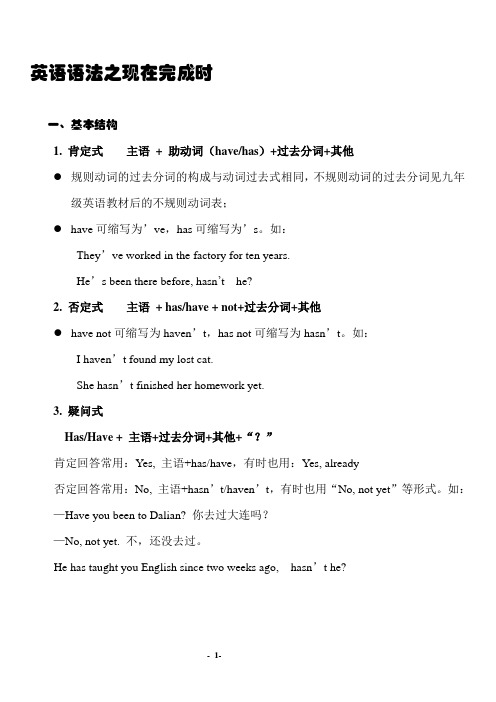
英语语法之现在完成时一、基本结构1. 肯定式主语+ 助动词(have/has)+过去分词+其他●规则动词的过去分词的构成与动词过去式相同,不规则动词的过去分词见九年级英语教材后的不规则动词表;●have可缩写为’ve,has可缩写为’s。
如:They’ve worked in the factory for ten years.He’s been there before, hasn’t he?2. 否定式主语+ has/have + not+过去分词+其他●have not可缩写为haven’t,has not可缩写为hasn’t。
如:I haven’t found my lost cat.She hasn’t finished her homework yet.3. 疑问式Has/Have + 主语+过去分词+其他+“?”肯定回答常用:Yes, 主语+has/have,有时也用:Yes, already否定回答常用:No, 主语+hasn’t/haven’t,有时也用“No, not yet”等形式。
如:—Have you been to Dalian? 你去过大连吗?—No, not yet. 不,还没去过。
He has taught you English since two weeks ago, hasn’t he?二、现在完成时的用法1. 过去的动作,对现在的影响:表示动作发生在过去,强调对现在造成影响。
此情况多用瞬间动词,如吃饭、起床。
如:I have had lunch already, so I am not hungry now.I got up late this morning, so I didn’t catch the bus to cshool.简单来说就是,动作发生在过去的某一时间点,对现在造成了影响时间轴表示:2.动作发生在过去,并且现在持续进行。
表示过去已经开始,持续到现在的动作或状态,这种用法中的谓语动词一般为延续性动词(或反复性动词)。
现在完成时语法

7. 结尾的字母d变t。如: lend → lent → lent; build → built → built; send → sent → sent 8. 变为以-ought或-aught结尾。如: buy → bought → bought; bring → brought → brought; catch → caught → caught; teach → taught → taught
3. 以“辅音字母 + y”结尾的动词,变y为i, 再加-ed。如: study → studied → studied; hurry → hurried → hurried; reply → replied → replied 4. 词尾只有一个辅音字母的重读闭音节动 词,要双写辅音字母,再加-ed。如: stop → stopped → stopped; clap → clapped → clapped
一、过去式和过去分词的变化相同 规则变化: 1. 一般在动词词尾直接加ed。如: pick → picked → picked; wish → wished → wished; stay → stayed → stayed 2. 以不发音的e结尾的动词后面加d。如: like → liked → liked; hope → hoped → hoped; phone → phoned → phoned
句式 1. 肯定句:主语 + have / has + 过去分词 (+ 其他) 2. 否定句:主语 + have / has + not + 过去 分词(+ 其他) 3. 一般疑问句:have/ has + 主语 + 过去 分词(+ 其他)
2024年中考英语语法课件-现在完成时

现在完成时肯定句的构成
第三人称单数(he/she/it)+ has+过去分词
Tom has been absent for three days. 汤姆三天没来了。 She has gone to the town. 她进城了。
例1 We have known each other
since 2005. 我们从2005年认识的。
现在完成时
现在完成时定义
现在完成时表示过去发生或已经完成的某 一动作对现在造成的影响,还表示过去已 经开始,并且持续到现在的动作或状态。
现在完成时定义三要素
1
2
3
现在为止已 经完成或刚 刚完成的动 作
一件发生在 过去的事情 对现在产生 影响
一个动作开 始于过去并 持续到现在
现在完成时肯定句的构成
(手是干净的)
现在完成时的用法
表示从过去开始并持续到现在的动作或状态。 She has learned English for 5 years. 她学英语已经五年了。 He has lived in Beijing since he was born . 从他出生那天起就住在北京。 Has he lived in Shenzhen for 4 years? 他住在深圳四年了吗?
They haven't finished the job yet. 他们尚未完成该项工作。
She hasn't travelled on a train . 她没有坐火车旅行过。
I haven't finished my homework yet. 我还没有完成我的作业。
现在完成时的疑问句的构成
过去分词的变化(规则)
一般动词,在词尾直接加“ ed ”。 work---worked---worked
现在完成时 语法讲解

现在完成时(一)定义:表示到现在为止发生过的动作或状态,也可表示过去已经开始,一直延续到现在的动作或状态;强调过去与现在之间的联系。
(二)构成(即谓语动词形式):助动词have/has+P.P.(过去分词)当主语是第三人称单数时,由has+过去分词构成;当主语是非三人称单数时,由have+过去分词构成。
例如:I have been to Beijing three times. (主语是非三人称单数)He has been to Beijing three times. (主语是三人称单数)(三)句型转换1、否定句:助动词have/has+not+ P.P.(过去分词)构成分别缩写为:haven’t+ P.P.或hasn’t+ P.P.例如:I haven’t been to Beijing three times.He hasn’t been to Beijing three times.2、一般疑问句:Have/Has+主语+ P.P.(过去分词)+其他成分?肯定回答:Yse, ~have/has. 否定回答:No, ~haven’t/hasn’t.例如:Have you been to Beijing three times?Yes, I have. / No, I haven’t.Has he been to Beijing three times?Yes, he has. / No, he hasn’t.(四)基本用法1、过去发生或已完成的某个动作对现在产生的影响或结果,强调的是这个影响或结果。
<又叫“完成用法”>常同already, just, yet等时间状语连用例如:I have just turned off the light. 我刚刚把灯关上。
(结果是灯已经关上了)She has lost her bike.她把自行车丢了。
(影响是他现在没有自行车骑了)The rain has stopped now.雨已经停了。
现在完成时的四种句型结构

现在完成时的四种句型结构现在完成时,这个听起来有点复杂的语法点,其实特别有趣!让我们一起来聊聊这四种句型结构,顺便看看怎么用它们来描述生活中的点点滴滴。
你知道吗,现在完成时最妙的地方就是它可以把过去和现在联系起来,就像一根隐形的绳子,把那些有趣的经历串联起来,真是让人怀旧又兴奋。
第一个句型就是“主语 + have/has + 过去分词”。
比如,我常常说:“我已经吃过午饭了。
”嘿,吃饭这事儿可不能马虎,尤其是当你肚子咕咕叫的时候。
不过呢,有时候我吃得太快,甚至有点心虚。
这种情况下就可以说:“我已经吃过了,但感觉还想再来一份。
”想想看,那种一边吃一边自我怀疑的感觉,是不是特别有趣?生活就是这么丰富多彩,你永远不知道下一餐会是什么样的惊喜。
然后是第二个句型,“主语 + have/has + not + 过去分词”。
这时你就可以来个调皮的反转,比如说:“我还没看那部电影。
”哎呀,朋友们都在讨论这部电影的结局,听得我心里痒痒的。
其实这也是一个好借口,可以跟朋友们一起去看,顺便享受一顿美味的爆米花。
每次这种时候,我都觉得自己像个孩子,期待着新奇的冒险。
再来就是第三个句型,“疑问句”,比如说:“你有没有去过那个新开的咖啡店?”哇,那家咖啡店真的是个宝藏,环境超级好,咖啡香气四溢。
每次一聊到咖啡店,我的脑海里就浮现出那些温暖的瞬间,和朋友们在一起喝咖啡、闲聊的时光,简直是生活的调味剂。
你看,这种时候就像是在用过去的经历来丰富现在的生活,不得不说,语言真是个神奇的工具。
最后是“疑问句的否定形式”,比如:“你是不是还没读完那本书?”哈哈,这个问题一问出来,瞬间就能引发一场讨论,尤其是书迷之间。
读书这事儿,不光是获取知识,更是享受那种沉浸的感觉。
当你在书页间徘徊时,仿佛置身于另一个世界,逃离现实的喧嚣,真的是一种享受。
说到这里,心里不禁又想起那些经典名著,简直是个心灵的充电宝。
有时候我们在聊天中,也常常会用到这些句型来分享我们的经历。
现在完成时语法课件

翻译句 子:
1. 吉姆买了这只钢笔两年了。
2. 李雷已经入党两年了。
3. 那部电影开始30分钟了。 ○ Jim ____ _____the pen for two years. ○ Li Lei ____ ____ ____the Party for two years. ○ The film ____ ____ _____for thirty minutes.
•常见非延续性动词与延续性动词(或状态动 词)的对应关系如下: •open--b--e- open close-b--efall asleep--b-e- asleep closed
•die----b--e dead becombe---
•begin/start---b-e- on
•come/go/arrive/get/reach/mobveei-n-/--a-t-
have/has been in
1.Where is Jim? Hheas gone
Wuhan.
to have been
2. My parenttos
the Great Wall
tHwaicvee. They likbeetehnerteo very much.
•
yohuasever
valley?
曾经去过某地(表示某人的一种 经历),可与once, twice, already, ever, never等连用。
逗留在某地(已经一段时间),常 3.Say the differences:和hheafvroee/r等htaes连nb用eden。atyos,since I came
have/has gone to
时间 状语:
already, yet, ever, never, just, before;
现在完成时语法

3. This/ That is the+最高级+ 名词+(that)+现在完成时。 e.g. This is the best film (that) I’ve ever seen.
注意:
1、have been to表“去过某 地”,是回来后再谈论去过 某地的情况;have gone to表 “到某地去了”,此人可能 还在路上,也可能已经到达, 但一定不再说话者这里。
6. – We haven’t heard from Jane for a long time. ---- What do you suppose _______ to her? A. was happening B. to happen C. has happened D. having happened
Biblioteka I have got home now.(强调现在已经到家)
改 错
1.All these years they are contributing articles to our magazine. are----have been 2. What have you been doing before you left Oxford? have----had 3. It is a good job. Have you done it all by yourself? Have you done---Did you do 4. It is a long time since you come to see me. 5. I am glad to tell you thatcome---came you passed the exam. passed----have passed
- 1、下载文档前请自行甄别文档内容的完整性,平台不提供额外的编辑、内容补充、找答案等附加服务。
- 2、"仅部分预览"的文档,不可在线预览部分如存在完整性等问题,可反馈申请退款(可完整预览的文档不适用该条件!)。
- 3、如文档侵犯您的权益,请联系客服反馈,我们会尽快为您处理(人工客服工作时间:9:00-18:30)。
现在完成时的基本句型:肯定式:主语+ 助动词 have/has + 动词的过去分词.疑问式:助动词 Have/Has + 主语+ 动词的过去分词?否定式 :主语+ 助动词 have/has + not + 动词的过去分词.例句:1.I have cleaned my room. 我已打扫了房间。
2.He hasn ’ t finishedhis homework. 他还没完成作业。
3.Have you read this novel ? 你看过这本小说吗?Yes , I have. 是的,看过了。
No, I haven’不,t.没看过。
4.We have studied English for two years.我们已经学了两年英语了。
5.They haven ’ t se e nach other since 1998.自从 1998 年他们就没再见过面。
现在完成时的主要用法1.表示过去发生的某一动作对现在造成的影响或结果。
-- It’s so dark.--Someone has turned off the light.(有人刚把灯关了,对现在造成的结果是:现在很黑 )--Are you free?--I have finished my homework. I am free(我已经完成了家庭作业,对现在造成的结果是很有空)2.表示过去已经开始, 持续到现在的动作或状态,可以和表示从过去某一时刻延续到现在的一段时间的状语连用.表示持续动作或状态的词应是延续性动词 .常与since + 过去的时间点,since+谓语是一般过去时的从句;for + 一段时间, so far 等时间状语连用。
如:I have learnt English for more than ten years. 我已经学了 10 多年的英语。
(从 10 年前开始 ,持续到现在还在学 )She has swum since half an hour ago.我已经游泳了半个小时(半个小时前已经开始游泳,到现在还在游)3.表示人曾有过或到目前为止从未有过的经历.I have ever been to the Summer Palace?(我曾去过颐和园)I have never had a car.(我从未有过汽车。
)现在完成时的时间状语常与① already, ② never,③ ever,④ just(刚才),⑤ yet,⑥before,⑦ up to now, ⑧ so far(到目前为止) , ⑨ for the last few weeks, ⑩ thesedays, ⑾ since 2010/ two years ago, since he came here, ⑿ for a long time(13) in the last/ past⋯ years 等连用。
a)already 往往用于肯定句,用在疑问句时表示强调或加强语气; yet 用于否定句和疑问句。
eg:?He has already left here. 他已经离开这里了。
?Has he already left here?他(真的)已经离开这里了吗?(表示加强语气)?My teach ers haven ’ t had breakfast yet我的.老师们还没有吃早饭。
?Have you written to your parents yet? 你已经给你父母写过信了吗?b) never 是否定词,表示“从来没有”,而ever表示“曾经”?We have never been to the Great Wall. 我们从来没有去过长城。
? Have you ever been to Canada?你们曾经去过加拿大吗?c) just 表示“刚刚”(用于完成时态时,与 already ,never 等副词的位置一样,多用在助动词 have/has 和动词过去分词之间) ,just now(用于过去时 )?He has just come back. 他刚刚回来。
?They have just finished the work. 他们刚刚完成那项工作。
d) before 用于完成时,而ago 用于过去时- 1 -?He has started his work ten years before.他十年前就已经开始他的工作了。
?He started his work ten years ago. 他是十年前开始他的工作的。
?常用于现在完成时的时间副词,介词 :already (已经 ): 用于肯定句I have already posted the letter .yet(已经 ): 用于否定句 ,疑问句He hasn ’ t done his homework yet.just( 刚刚 ) They have just left.ever(曾经 ) Have you ever been to Beijing ?never(从不 ) I have never seen him .before(以前 ) Have you seen the film before?since(自从⋯以来 ) I’ ve worked in the school since 1999.for( 长达 ) He ’ s lived in Shenzhen for 6 years.in the past several days / weeks/ years(在过去的⋯)recently( 最近 ) I have not written to my parents recently.so far(到目前为止 )So far she has learned 5 English songs.up to now( 到目前为止 )this morning/month/year( 今天早上 /这个月 /今年 )现在完成时与一般过去时的区别I lived there 2 years agoI have lived here for two yearsI have lived here since two years ago.I have lived here since I came here.1.都表示过去发生的事2.现在完成时强调过去和现在的联系,不能和具体的时间状语连用;3.一般过去时强调过去发生的事或状态与表示过去的具体时间连用(last, ago, yesterday, etc. )当有一个表示过去某时的状语时,不能用现在完成时,而多用一般过去时。
I saw Mary an hour ago.She lost her handbag yesterday .有些时间状语,既能用于现在完成时,又能用于一般过去时,但意义上有差别。
I ’ ve written three letters this morning.(说话时仍是上午)I wrote three letters this morning.(说话时仍是上午或晚上)现在完成时强调动作或事情发生在过去,一直延续到现在,而且还有可能继续延续下去;而一般过去时只表示发生在过去的动作或事情。
I have taught this class for ten years.(还在教)I taught this class for two years. (曾教过两年,现在不教了)一般过去时态和现在完成时态同义转换1.我们买这本书三年了.We have had the book for three years.We bought the book three years ago.2.他感冒三天了 .He has had a cold for three days.He caught a cold three days ago.3.我借的这本书一周多了.I have kept the book for a week .I borrowed the book a week ago.4.我成为一个学生两年多了.I have been a student for over two years.I became a student two years ago.5.Mr Black 死了三年了。
Mr Black has been dead for three years.Mr Black died three years ago.重点句型 :It is/ has been+段时间 +since 从句段时间 +has passed+ since从句eg. 他去世了两年了:He died two years ago.He has been dead for two years /since two years agoIt is/ has been two years since he died.Two years has passed since he died.注 : 现在完成时不能和表示过去的时间状语如:yesterday, last year, in 1980,three days ago, just now, when I came in 等连用Pay attention 注意不能是具体过去时间1.现在完成时句中常见的时间状语A.表示从过去一直持续到现在,不能是具体过去时间B.just,already,yet,before/ ever,never 有此类副词时,常强调动作完成,不强调动作的持续.eg.Have you ever been to Japan?I have just finished my homework.I have finished my homework already.I haven ’ t finished my homeworkyet2.区分短暂性动词与持续性动词.英语的行为动词大体可以分为两大类型:一是延续性的动词,二是短暂性动词。
延续行动词是指那些动作意义不会一下完成,而是可以延续、发展的动词。
如:work,read,write,study 等 ,短暂性动词是指那些动作一次完成,不能延续的动词。
如: come, go, buy, die, borrow,begin 等。
表示短暂性 (瞬间性 )的动词在现在完成时的句中不能和一段时间连用.即 for,since短语或 how long 问句I have bought this pen for two months.(错)I have had this pen for two months.(正确)How long have you had this pen.?(正确 )The play has begun for an hour.(错)The play has been on for an hour.(正确)结束性动词不能和表示一段时间的时间状语连用,但是他可以转换成相应的延续性动词.1.直接用延续性动词buy–have catch(get) a cold –have a cold borrow— keep come/go /become— be put on-- wear2.转换成 be+名词join the army –be a soldier join the Party –be a Party membergo to school–be a student3 转换成 be+形容词或副词die— be dead finish –be over begin— be on open— be open leave— be away (from ⋯)fall sleep –be asleep close –be closed 4.转换成be+介词短语go to school–be in school join the army –be in the army但在否定句中,短暂性动词可以与时间段连用。
